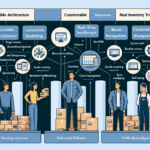Oracle Warehouse Management Cloud (WMS) vs NetSuite WMS
Effective inventory management is paramount for business success, particularly in the rapidly growing e-commerce sector. As supply chain dynamics evolve, implementing a robust Warehouse Management System (WMS) becomes essential. Oracle and NetSuite are two leading providers offering comprehensive WMS solutions, each catering to different business needs. This detailed comparison examines Oracle Warehouse Management Cloud (WMS) and NetSuite WMS, highlighting their features, advantages, and suitability to help you determine the best fit for your organization.
Overview of Oracle Warehouse Management Cloud (WMS)
Oracle WMS is a cloud-based solution designed to automate and optimize warehouse operations with high precision and efficiency. It encompasses comprehensive inventory management, receiving, picking, shipping, and returns management functionalities, delivering real-time visibility into warehouse activities.
One of Oracle WMS's standout features is its seamless integration with other Oracle Cloud applications, such as Oracle Transportation Management and Oracle Order Management. This interconnected ecosystem ensures coordinated efforts across different supply chain segments, enhancing overall operational efficiency and minimizing errors.
Additionally, Oracle WMS offers advanced analytics and reporting tools, enabling businesses to derive actionable insights from warehouse data. Customizable dashboards and real-time data analytics allow monitoring of key performance indicators (KPIs) and identification of improvement areas, fostering data-driven decision-making.
Overview of NetSuite WMS
NetSuite WMS is a comprehensive cloud-based solution that provides end-to-end warehouse management capabilities. Its unified platform is designed to optimize fulfillment processes, enhancing both efficiency and accuracy. NetSuite WMS integrates seamlessly with supply chain operations, allowing real-time inventory management from procurement to fulfillment.
NetSuite WMS boasts advanced reporting and analytics functionalities, offering deep insights into warehouse operations for informed decision-making. Features such as wave management, pick and pack, and cycle counting streamline warehouse activities and reduce operational errors. Moreover, NetSuite WMS includes mobile capabilities, enabling warehouse staff to access real-time information and perform tasks on-the-go, thereby boosting productivity and reducing operational downtime.
Key Differences between Oracle WMS and NetSuite WMS
While both Oracle and NetSuite WMS offer robust warehouse management solutions, they cater to different market segments and business needs. Oracle WMS is tailored for large enterprises with complex warehouse operations, focusing on optimizing inbound and outbound logistics. Its scalability and advanced features make it a preferred choice for organizations with extensive supply chain requirements.
In contrast, NetSuite WMS is ideal for small to mid-sized businesses seeking an integrated, all-in-one WMS solution. Its subscription-based pricing model offers affordability and flexibility, making it accessible for businesses with limited upfront budgets. NetSuite’s unified platform simplifies warehouse management by consolidating various supply chain functions into a single system.
Another significant difference lies in their pricing structures. Oracle WMS typically involves substantial initial investments and ongoing maintenance costs, suitable for larger companies with substantial budgets. NetSuite WMS, with its scalable subscription model, presents a more cost-effective solution for smaller enterprises aiming to minimize upfront expenditures.
Features Comparison
Features of Oracle WMS
Oracle WMS offers a comprehensive suite of features designed to enhance warehouse operations:
- Inventory Management: Advanced tools for accurate inventory tracking and management.
- Automated Receiving and Shipping: Streamlines the receipt and dispatch of goods, reducing manual errors.
- Cross-Docking: Facilitates efficient transfer of products between inbound and outbound transportation.
- Real-Time Visibility: Provides up-to-the-minute data on warehouse operations, inventory levels, and order statuses.
- Advanced Analytics: Customizable dashboards and reporting tools for detailed performance analysis.
- Integration Capabilities: Seamlessly integrates with other Oracle applications and third-party logistics providers.
These features collectively ensure that Oracle WMS can handle large-scale warehouse operations with high efficiency and accuracy, making it suitable for enterprises with complex logistics needs.
Features of NetSuite WMS
NetSuite WMS is equipped with a range of features aimed at optimizing warehouse operations:
- Intuitive User Interface: User-friendly design with drag-and-drop functionality for ease of use.
- Advanced Fulfillment: Comprehensive solutions for picking, packing, and shipping processes.
- Efficient Fulfillment Capabilities: Enhances the speed and accuracy of order fulfillment.
- Mobile Functionality: Supports barcode scanning and voice picking to improve operational efficiency.
- Real-Time Inventory Management: Provides up-to-date information on stock levels and order statuses.
- Customizable Dashboards: Tailored reporting and analytics for monitoring key performance metrics.
NetSuite WMS’s robust feature set is designed to streamline warehouse operations, making it an excellent choice for businesses looking to enhance efficiency and accuracy in their fulfillment processes.
Pros and Cons
Pros and Cons of Oracle WMS
Pros:
- Comprehensive end-to-end warehouse management with advanced automation features.
- Highly scalable and customizable to meet specific business needs.
- Seamless integration with other Oracle products, enhancing overall operational efficiency.
- Advanced analytics and reporting for informed, data-driven decision-making.
Cons:
- High implementation and maintenance costs may be prohibitive for smaller businesses.
- Complex deployment process requiring significant time and resources.
- Steep learning curve with the need for extensive training and expertise.
- User interface may be less intuitive, potentially affecting user experience.
Oracle WMS is a powerful solution for large enterprises requiring extensive customization and integration capabilities. However, its high cost and complexity may be challenging for smaller organizations.
Pros and Cons of NetSuite WMS
Pros:
- Intuitive user interface requiring minimal training.
- Comprehensive end-to-end inventory and fulfillment management.
- Advanced fulfillment functionalities such as wave management and cycle counting.
- Seamless integration with other NetSuite modules like ERP and CRM.
- Mobile capabilities including barcode scanning and voice picking enhance operational efficiency.
- Flexible subscription-based pricing model suitable for small to mid-sized businesses.
Cons:
- May lack some advanced functionalities required by large enterprises.
- Higher total cost of ownership for extensive integrations and customizations.
- System performance issues such as slow processing and occasional downtime reported by some users.
NetSuite WMS offers a user-friendly and comprehensive solution ideal for small to mid-sized businesses. While it excels in ease of use and integration within the NetSuite ecosystem, it may fall short in providing certain advanced features needed by larger organizations.
Cost Comparison between Oracle and NetSuite WMS
The cost structures of Oracle WMS and NetSuite WMS differ significantly, catering to different business sizes and budgets. Oracle WMS typically involves a substantial upfront investment, including licensing fees, implementation costs, and ongoing maintenance expenses. This makes it a viable option for large enterprises with the financial capacity to support its comprehensive features.
Conversely, NetSuite WMS operates on a subscription-based pricing model, which is generally more affordable and flexible. Pricing is based on the number of users and the level of functionality required, making it accessible for smaller businesses aiming to minimize initial costs. However, additional expenses may arise from integrating third-party systems or customizing the solution to meet specific requirements.
It's essential to consider not only the initial costs but also the long-term value and scalability of the WMS. While Oracle WMS may have higher upfront costs, its scalability and extensive feature set can provide significant returns for large businesses. NetSuite WMS, with its lower initial costs and flexible pricing, offers a cost-effective solution for growing businesses.
For a detailed cost analysis and to understand the total cost of ownership, businesses should consult with WMS experts or vendors to tailor the solution to their specific needs and budget constraints.
Implementation Process for Oracle and NetSuite WMS
The implementation processes for Oracle WMS and NetSuite WMS are tailored to accommodate the complexity and customization required by different businesses.
Oracle WMS: The implementation of Oracle WMS is typically more complex, involving detailed onboarding sessions, comprehensive training programs, and extensive customization to align with specific business workflows. Organizations may require the assistance of Oracle-certified consultants to ensure a smooth deployment and integration with existing systems.
NetSuite WMS: On the other hand, NetSuite WMS offers a more streamlined implementation process with quicker onboarding times. Its intuitive user interface reduces the learning curve, allowing businesses to start leveraging the system's capabilities with minimal training. NetSuite provides robust support and resources to facilitate efficient implementation.
Both solutions emphasize the importance of thorough planning and alignment with business objectives to ensure successful deployment and maximum return on investment.
Integration Capabilities with Other Systems
Integration capabilities are crucial for ensuring seamless operations across different business functions. Both Oracle WMS and NetSuite WMS offer robust integration options, but they cater to different ecosystems.
Oracle WMS: Oracle WMS seamlessly integrates with other Oracle applications such as Oracle Finance Cloud and Oracle ERP Cloud. Additionally, it supports industry-specific integrations, facilitating streamlined warehouse operations and data consistency across platforms.
NetSuite WMS: NetSuite WMS integrates effortlessly with other NetSuite modules like CRM and Financial Management. It also supports integrations with third-party systems, including shipping providers and Electronic Data Interchange (EDI) systems, enhancing its flexibility and scalability.
These integration capabilities ensure that both Oracle WMS and NetSuite WMS can function cohesively within broader enterprise systems, promoting operational efficiency and data integrity.
User Experience Comparison
User experience plays a significant role in the effectiveness of a Warehouse Management System. Oracle and NetSuite WMS offer distinct user experiences tailored to their target audiences.
Oracle WMS: Oracle WMS provides a highly customizable user interface, allowing businesses to tailor the system to their specific needs. Its mobile capabilities offer flexible solutions for warehouse staff, enhancing real-time data access and task management. However, the extensive customization options may require more training and adaptation time for users.
NetSuite WMS: NetSuite WMS is renowned for its intuitive user interface, featuring drag-and-drop functionality that simplifies navigation and operation. This ease of use reduces the training required for warehouse staff, enabling quicker adoption and productivity. The system also includes real-time monitoring and live dashboards, empowering users with immediate insights into warehouse performance.
While Oracle WMS offers greater customization, NetSuite WMS excels in user-friendly design, making it more accessible for businesses seeking a straightforward and efficient user experience.
Customer Support Comparison
Reliable customer support is essential for maximizing the benefits of a WMS. Both Oracle and NetSuite provide comprehensive support services, though their approaches differ.
Oracle WMS: Oracle offers a dedicated onboarding team to assist with the initial setup and deployment of WMS. Their support includes 24/7 global service availability, ensuring that businesses can receive assistance whenever needed. Additionally, Oracle maintains a vast user community, fostering knowledge sharing and collaborative problem-solving among users.
NetSuite WMS: NetSuite provides access to a dedicated account manager who serves as a primary point of contact for support and guidance. Their comprehensive support portal includes an extensive knowledge base with articles, tutorials, and FAQs. Furthermore, NetSuite offers SuiteAnswers, a community-driven platform where users can seek support and share insights with peers.
Both Oracle and NetSuite are committed to delivering high-quality customer support, ensuring that businesses can effectively utilize their WMS solutions to achieve operational excellence.
Conclusion: Which System is Best for Your Business?
Choosing between Oracle WMS and NetSuite WMS hinges on your business's specific needs, budget, and warehouse operation complexity. Oracle WMS is ideally suited for large-scale enterprises with intricate logistics requirements, offering extensive customization, scalability, and integration capabilities. Its robust feature set and advanced analytics make it a powerful tool for organizations aiming to optimize complex warehouse operations.
In contrast, NetSuite WMS is tailored for small to mid-sized businesses seeking an all-in-one, user-friendly WMS solution. Its intuitive interface, flexible pricing model, and seamless integration within the NetSuite ecosystem make it highly attractive for companies looking to enhance efficiency without significant upfront investments.
Ultimately, the best way to determine the most suitable WMS for your business is to conduct a thorough evaluation based on your operational requirements, budget constraints, and long-term scalability goals. Consulting with WMS experts or conducting trials can further aid in making an informed decision that aligns with your business objectives.



















